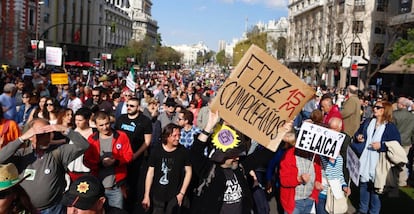The legacy of the 15-M movement
The spirit is still there, but Spain’s parties haven’t channeled it

Five years on, despite the absence of a party structure, something remains of the spirit of Spain’s so-called Indignados movement – better known here as the 15-M movement, in recognition of the date, May 15, on which the first of many massive protests were staged in Madrid’s central Puerta del Sol square in 2011. The spirit of those demonstrations that gripped the country throughout the summer and autumn of that year is still with us, but has been taken into account only partially by the country’s politicians.
The 15-M movement was not the sole focus of the demands made five years ago by Spaniards angry at the failure of the political classes to deal with the crisis that began in 2008, but it certainly generated a public debate about the country’s institutions, its electoral rules, evictions of people trapped in negative equity, senior officials’ pay, and of course corruption. It emerged in the context of the poverty created by the economic crisis, austerity policies and youth unemployment, and the anger it expressed found a channel on the internet and the social networks.
The party led by Pablo Iglesias struggles to overcome the inherent contradictions produced by opportunistic leaders from other fields and the need to find a way to implement the demands of the 15-M
Where the 15-M was less successful was in channeling what began as a rejection of political orthodoxy, best expressed by its slogan: “They don’t represent us”, highlighting the conservative Popular Party (PP) and the Socialists of the PSOE as two sides of the same coin. Since then, new parties and politicians have emerged, of which Podemos has garnered the most votes.
But the party led by Pablo Iglesias struggles to overcome the inherent contradictions produced by opportunistic leaders from other fields and the need to find a way to implement the demands of the 15-M and thus avoid radicalization: some sectors of the movement had already crossed that line by organizing disturbances outside the Catalan regional parliament and Congress in Madrid. Since then, the success of Podemos at the polls has seen fewer street protests. That said, many of the people attending the gathering to commemorate the fifth anniversary of the 15-M in the Puerta del Sol last Sunday were deeply skeptical about whether Podemos really represented their interests and concerns.
Spain’s political parties will need to work much harder if they are to prevent what has been called the country’s best-educated generation from being consigned to the scrap heap: their demands must be at the top of the next government’s agenda. Spain’s politicians must also understand that unless they start listening to the electorate and stick to the promises they have made, the consequences will be yet further erosion of trust in the political system, something that surely no democrat wants.
Sign up for our newsletter
EL PAÍS English Edition is launching a weekly newsletter. Sign up today to receive a selection of our best stories in your inbox every Saturday morning. For full details about how to subscribe, click here.
English version by Nick Lyne.








































